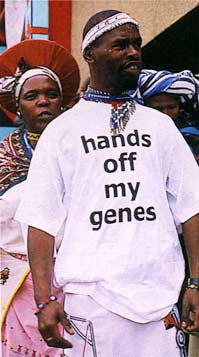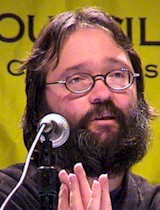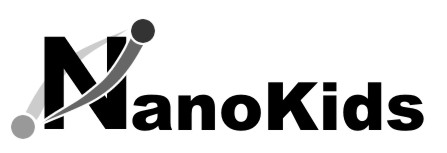Nanotech: Tiny Science,
Huge Threat
Taken from
Cascadia Media Collective posting on InfoShop on Friday
July 18 2003 @ 09:13PM PDT

Imagine I was selling a magic machine that would solve all your problems-
and make me rich. Imagine I told you that you already bought it, thank you very
much, and all your problems will soon be solved. Would you be worried? Would it
concern you if I dismissed any questions you had or your neighbors cries that
the magic machine was really no good?
That's where we find ourselves with the new science of nanotechnology
(See "University of Oregon puts big hopes in tiny
technology" RG 7/14/03) We're told that nanotech is already on its way
and don't worry - we'll love it. Quick fix solutions for our problems;
tax-funded research, megaprofits and unprecedented power for the
nanotechnologists. This new science threatens to create a sci-fi future ruled
by a global super-elite with nanotechnology forced upon the minds, bodies and
surroundings of everyone else. Nanotech insider-literature clamors for just
that. If we take what they are pushing -- we will be making a very big mistake.
Nanotech is a field in which industrial, medical and military scientists
manipulate single molecules or atoms at the scale of one-billionth of a meter.
The two primary results are super-tiny super-computers and a vastly enhanced
ability to mesh living and non-living material. The US government
predicts that nanotech will be a trillion dollar industry
within ten years.Nanopatriarch Richard Smalley calls it
"the ultimate level of control." Mihail Roco,
chairman of the now $800 million National Initiative on Nanotechnology "
(thanks to OR Sen. Ron Wyden) envisions using nanotech to ramp up the
integration of humans and machines to create a "global
hive-consciousness" as the next step towards "conquest of
nature." (National Science Foundation/US Dept. of Commerce Report,
"Converging Technologies to Improve Human Performance" June 2002
pg.93)
Such aims have raised concerns for people around the world who love freedom
from control and unconquered nature. Those voices calling for changes to the
agenda would never be heard if the nanotechnologists had their way. We cannot,
however, safely put our uncritical trust in the hands of people set to make
unimaginable sums of money and change the human experience forever; especially
when they deliberately try to silence their critics.
 A small-scale farmer in traditional dress protests against
planting GM crops. (from Farmer’s Weekly, 20 September 2002)
Vital perspective on nanotech is offered, for example, from post-colonial
Africa. Last December members of civil society from 8 nations there released
their Cape
Town Declaration, calling for full disclosure and global public
participation in decisions about nanotech. They said they would not accept
vague promises from nanotechnologists to use nanotech to clean up destruction
caused by past and current use of First World power and technology in Africa.
Just like genetic engineers, the nanotech industry promises to feed the
world and eradicate poverty. Just like with GE foods, when Africans say the
"help" isn't worth the price it comes at, their concerns are ignored.
Though the five
major
nanotech
internet
newswires post nearly
100 stories total each day, the words "Cape Town Declaration" have
never appeared on any of them.
 ETC group
Nanotech's critics also include the ETC Group (for Erosion, Technology and
Concentration, etcgroup.org), an international agriculture think-tank.
They blew the whistle on Monsanto's Terminator Technology, intended to render
seeds sterile so famers had to buy new seeds from the company every year. They
also worked with the World Congress of Indigenous People to fight the racist
bio-piracy included in the Human Genome Diversity Project. They are now
focusing much of their energy on
nanotech. ETC does not oppose nanotech itself, but warns
that the way it is being developed threatens widespread ecological damage and a
deepening of the gap between the power of those who have access to key
technology and those who don't. More than a simple lack of access, at issue is
that super-small nanotech is being developed to create super wealth for the
already rich, super armies for the already strong, and super surveillance to
keep the rest of us in line.
The
nanotech industry tries to
write off ETC by focusing exclusively on the group's belief
that the "gray goo" theory is a possible consequence of nanotech.
Gray goo would be
nanorobots able to recreate themselves but incapable of
stopping, growing exponentially until their numbers drown us all in a global
cloud of gray goo. ETC are not fringe thinkers to fear gray goo- members of
Bush's EPA, the industry darlings at the
Center for
Responsible Nanotechnolgyand many other people quietly admit that gray goo
is a real threat. The industry is grasping at straws to slander ETC and silence
their alarm regarding plans to use nanotech to deepen elitist domination of a
devastated planet.
 Dr. Gregor Wolbring
A third key thinker being pushed out of the nanotech discussion is Dr.
Gregor Wolbring, director of the International Center for Bioethics, Culture
and Disability (bioethicsanddisability.org). Wolbring participated in some
of the first major US government strategizing around nanotech
(see "reports"). He supported nanotech
development, but only as part of a broader cultural change towards human rights
in disability (see great site on disability rights movement). He insisted
that people with disabilities be allowed to choose not to be altered by
nanotech and to accept themselves as they are if that is what they prefer to
do. Anyone saying no to nanotech, however, in not on the agenda of those in
pursuit of super-nano-power. Wolbring says he was dropped from the government
nanotech conference circuit in favor of people with disabilities who see
themselves as "broken" and want to be "fixed" at any cost.
Some pro-nano writers have gone so far as to predict that once nearly
everyone's bodies or minds have been altered by nanotech, failure to nano-ize
your child could be seen as child abuse.
(see,
for example the World Transhumanist Association)
 
Industry is aiming nanotech cartoons at school children
Building public consensus is a key part of the nanotech strategy. These
scientists know that in
many parts of the world they have lost the debateover genetically
engineered food and
they say they will not lose the debate over nanotech.
That's why the industry is
aiming
nanotech cartoons at school children ages K-12. That's why the last
National Initiative on Nanotechnology "hive-consciousness" conference
announced a new national TV station called
XLR8TV, "The world's
first, globally available, 24/7 TV channel dedicated to the enhancement of
human performance. You can bet that voices critical of quick fix solutions and
"the ultimate level of control" will not be given government-paid
access to grade schoolers or national TV. We may get stuck with what we paid
for, weather or not we chose freely to pay. We should tell the
nanotechnologists, and everyone pushing for more control for those in power,
that we're not buying what they're selling.

|